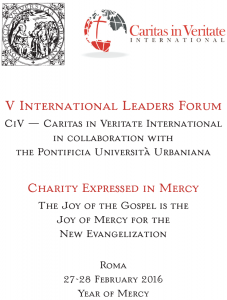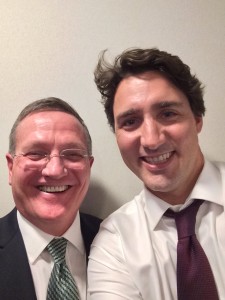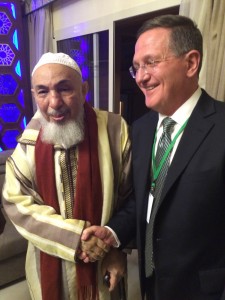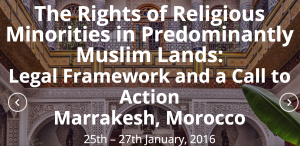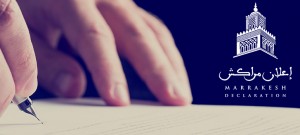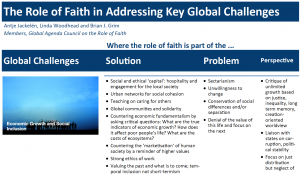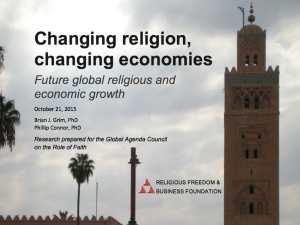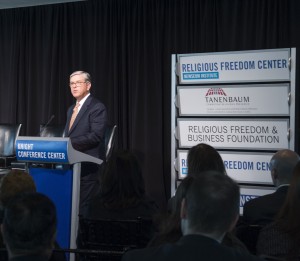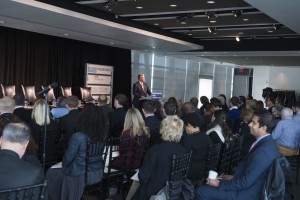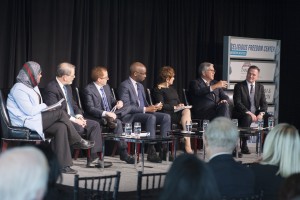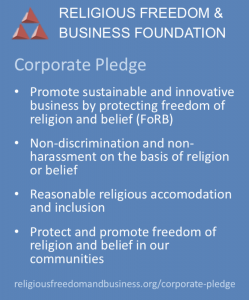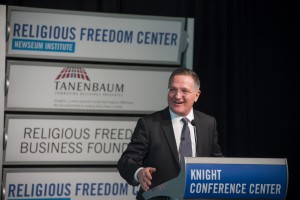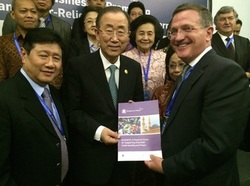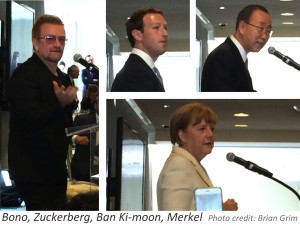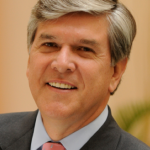“Religious freedom is good for business & business is good for religious freedom.” Brian Grim, President of the Religious Freedom & Business Foundation, will make the case this week at the Asia Pacific Religious Freedom Forum (APRFF), an invitation-only gathering of parliamentarians, government representatives, civic and religious leaders from across the globe who are committed to advancing religious freedom in the Asia Pacific (see APRFF on Twitter and Facebook).
Grim will make the economic case for religious freedom on the heels of his other recent high profile briefings, including with Canadian Prime Minister Justin Trudeau, and the organizer of the Marrakesh Declaration on protections for minorities in Islamic lands, Shaykh Bin Bayyah.
 In a recent article in Forbes, Grim along with Brian Walsh argue that even though the United States is still the world’s largest economy, today two Asian countries—neither historically nor majority Christian—have the second and third largest economies. The Pacific Rim as a whole, one of the most ethnically and religiously diverse regions on earth, is now also one of the most economically dynamic. The strength of the global economy has become religiously diverse, and this diversity will only increase in the next few decades.
In a recent article in Forbes, Grim along with Brian Walsh argue that even though the United States is still the world’s largest economy, today two Asian countries—neither historically nor majority Christian—have the second and third largest economies. The Pacific Rim as a whole, one of the most ethnically and religiously diverse regions on earth, is now also one of the most economically dynamic. The strength of the global economy has become religiously diverse, and this diversity will only increase in the next few decades.
According to a new study by the Religious Freedom & Business Foundation, the globe’s growing religious diversity is likely to be one of the 21st century’s most important developments for businesses and policymakers around the world. Burgeoning religious populations with greater wealth will have greater political influence, and this has the potential to either undermine or enhance social stability and economic strength.
To navigate this new economic landscape well—and to ensure continued economic growth—it will be vital that national and business leaders emphasize the protection of minority groups’ human rights, especially the rights and liberties of all religious groups. Government protection for the dignity and freedoms of all religious groups is the only way to ensure the full economic participation and prosperity of these groups as they also interact in new ways, and do so in free and peaceful environments.
Grim will also argue that businesses are uniquely situated to solve problems caused by religious restrictions and hostilities because they are at the crossroads of culture, commerce and creativity. Indeed, they have a vested interest because religious freedom is good for business. Research shows that religious freedom not only benefits the bottom line, but also improves the lives of women, consolidates democracy, and increases peace and stability.
According to a study by researchers at Georgetown University and Brigham Young University, Religious freedom is one of only three factors significantly associated with global economic growth. The study looked at GDP growth for 173 countries in 2011 and controlled for two-dozen different financial, social, and regulatory influences.
- The full report, “Is Religious Freedom Good for Business?: A Conceptual and Empirical Analysis,” is available on the website of the Interdisciplinary Journal of Research on Religion (IJRR). The authors of the study are Brian J. Grim, Georgetown University’s Berkley Center for Religion, Peace & World Affairs, and Greg Clark and Robert Edward Snyder, Brigham Young University’s International Center for Law and Religion Studies.
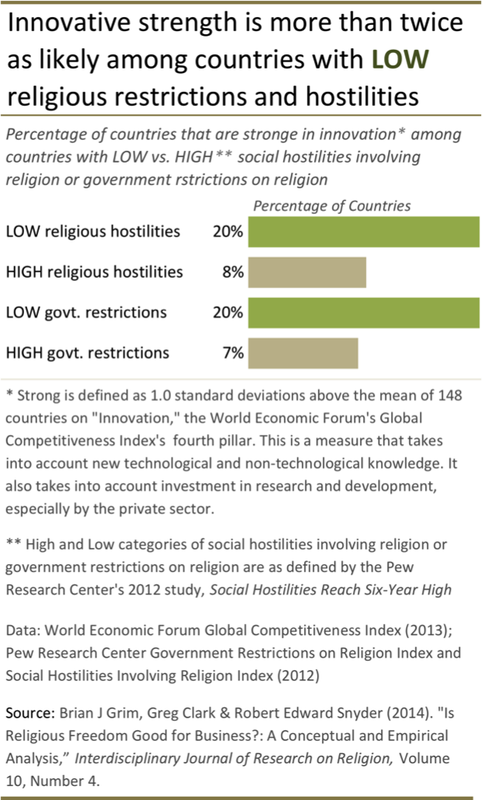
As the world navigates away from years of poor economic performance, religious freedom may be an unrecognized asset to economic recovery and growth, according to this new study. The study examines and finds a positive relationship between religious freedom and ten of the twelve pillars of global competitiveness, as measured by the World Economic Forum’s Global Competitiveness Index (see example in chart).
The study, however, goes beyond simple correlations by empirically testing and finding the tandem effects of government restrictions on religion and social hostilities involving religion (as measured by the Pew Research Center) to be detrimental to economic growth while controlling for 23 other theoretical, economic, political, social, and demographic factors.
The new study also furthers previous work in the field, including The Price of Freedom Denied (by Brian Grim & Roger Finke, Cambridge, 2011). Grim & Finke’s research showed that religious freedom is a key ingredient to peace and stability, as measured by the absence of violent religious persecution and conflict. This is particularly important for business because where stability exists, there is more opportunity to invest and conduct normal and predictable business operations, especially in emerging and new markets.
The new study observes that religious hostilities and restrictions create climates that can drive away local and foreign investment, undermine sustainable development, and disrupt huge sectors of economies. Such has occurred in the ongoing cycle of religious regulation and hostilities in Egypt, which has adversely affected the tourism industry, among other sectors. Perhaps most significant for future economic growth, the study notes that young entrepreneurs are pushed to take their talents elsewhere due to the instability associated with high and rising religious restrictions and hostilities.
Religious freedom when respected within a company can also directly benefit the bottom line. This includes both improved morale and lower costs. For instance, the clothing retailer Abercrombie & Fitch fought and lost a religious discrimination case in 2013 related to firing a Muslim stock girl for wearing a scarf in violation of the company’s dress code. The case resulted not only in substantial legal costs but also in negative national publicity.
Moreover, freedom of religion or belief is a human right protected in numerous treaties and agreements, including the UN’s Universal Declaration of Human Rights. The study suggests that businesses may gain a competitive advantage by meeting the expectations of stakeholders who are increasingly demanding that companies play a positive role in addressing issues of social concern and fairness.
The study’s findings are timely given the rising tide of restrictions on religious freedom documented by Pew Research, showing that 76% of the world’s people currently live with high religious restrictions or hostilities. And the findings are especially relevant because the research shows that the largest markets for potential growth are in countries where religious freedom is highly restricted – casting a question mark over the long-term sustainability of growth in countries such as China.
Religious Diversity, Freedom & Economic Growth
One indicator of a degree of religious freedom is when a population is religiously diverse. While the two are not always related, religious diversity is a clear sign that people in society are themselves open to freedom of religion and belief. There is also an interesting connection between religious diversity and economic success.
An analysis of a recent Pew Research Center Religious Diversity report – a study based on methodology developed by Brian Grim – finds that the 12 countries identified in the study as having very high religious diversity each outpaced the world’s economic growth between 2008 and 2012.
Among the 12 countries (5%) with very high religiously diversity, all are located outside of Europe and North America. Six are in Asia-Pacific (Singapore, Taiwan, Vietnam, South Korea, China and Hong Kong); five are in sub-Saharan Africa (Togo, Guinea Bissau, Ivory Coast, Benin and Mozambique); and one is in Latin America and the Caribbean (Suriname).
Between 2008 and 2012, the world’s average growth in gross domestic product (GDP) was 1.7%. By contrast, each of the 12 countries with very high religious diversity had higher average growth, and most by substantial margins.
Average GDP growth between 2008-2012 in China, the world’s 9th most religiously diverse country, averaged 9.3%. In seven of the twelve very diverse countries, average GDP growth was double or more that of the world average of 1.7%: Mozambique (7.0%), Vietnam (5.8%), Singapore (4.4%), Surinam (4.1%), Togo (4.0%), Benin (3,8%) and Taiwan (3.4%). In the remaining four very diverse countries, average GDP growth was also measurably higher than the world average: South Korea (2.9%), Ivory Coast (2.6%), Hong Kong (2.6%) and Guinea-Bissau (2.3%).
The underlying data for the religious diversity report are based on a December 2012 Pew Research Center study of the size and distribution of eight major world religions: Buddhists, Christians, folk religions, Hindus, Jews, Muslims, other religions considered as a group and the religiously unaffiliated. Taken together, these eight major groups comprise the world’s total population.
CHINA
During the Cultural Revolution of the 1960s and 1970s, religion was completely outlawed and people were routinely beaten and killed for having superstitious or religious beliefs. While it is true that today China has very high government restrictions on religion relative to other countries in the world, current conditions are far less restrictive than they were in the 1960s and 1970s.
Today, China has the world’s largest Buddhist population, largest folk religionist population, largest Taoist population, 9th largest Christian population and 17th largest Muslim population – ranking between Yemen and Saudi Arabia (Pew Research Center 2012).
It is undeniable that had the Cultural Revolution’s draconian restrictions on religion and all segments of society continued, China’s economic progress would not have been possible.
But how does business promote religious freedom, interfaith understanding and peace?
Using Marketing Expertise to Bridge Borders: Companies can make positive contributions to peace in society by mobilizing advertising campaigns that bring people of various faiths and backgrounds together, as seen in a variety of Coca-Cola advertisements, including one bringing Hindu-majority India and Muslim-majority Pakistan together through live video feeds in their vending machines.
Incentivizing Innovation: Because cross-cultural dialogue and cooperation is an essential part of daily work for multinational companies, one company, the BMW Group, incentivizes other organizations to create innovative approaches to interfaith understanding through an award organized in collaboration with the UN Alliance of Civilizations. Organizations that have won this award include a tour company in the Middle East, which offers new paths to build bridges and bring cultures together through profitable interfaith tourism. Another recognized intercultural innovator uses job placements agencies to help contribute to the religious diversity of workforces, including helping Muslim youth from poorer areas of the Philippines get jobs in the Catholic-majority parts of the country.
Incubating and Catalyzing Social Entrepreneurship: Business can also provide common ground where religious differences give way to shared concern and enterprise. In Nigeria, for instance, the Yola Innovation Machine, a peace-building organization, works to support companies and new entrepreneurs in conflict-affected areas as a way to reduce extremism.
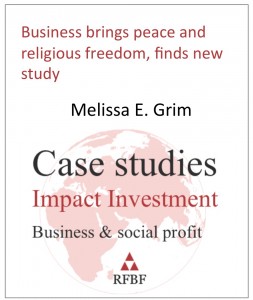 Supporting Workforce Diversity: In Indonesia, businesses are at the forefront of efforts to promote interfaith understanding. For instance, EXPRESS Taxi, with a fleet of more than 7,000 taxis in Jakarta, promotes a faith-friendly workplace by setting up prayer rooms and facilitating Muslim and Christian observances as well as celebrations of Chinese New Year. In addition, businesses in Indonesia have worked to fix large, seemingly intractable social problems such as helping 4,541 poor couples receive the proper marriage licenses in large-scale interfaith weddings.
Supporting Workforce Diversity: In Indonesia, businesses are at the forefront of efforts to promote interfaith understanding. For instance, EXPRESS Taxi, with a fleet of more than 7,000 taxis in Jakarta, promotes a faith-friendly workplace by setting up prayer rooms and facilitating Muslim and Christian observances as well as celebrations of Chinese New Year. In addition, businesses in Indonesia have worked to fix large, seemingly intractable social problems such as helping 4,541 poor couples receive the proper marriage licenses in large-scale interfaith weddings.
For more case studies, click here.
Asia Pacific Religious Freedom Forum (APRFF)*
The Asia Pacific Religious Freedom Forum is an invitation only gathering of religious freedom advocates committed to promoting religious freedom in their respective countries and abroad, from Feb. 18-21 in Taoyuan, Taiwan.
The Asia Pacific Religious Freedom Forum will bring together leaders of non-governmental organizations, religious leaders, and parliamentarians and other government representatives to address the deteriorating state of religious freedom and related human rights in the Asia Pacific region and the needed collaborative response from the international community.
Discussions will focus on specific themes related to advancing religious freedom in the Asia Pacific region, including coordinating advocacy efforts and diplomatic engagement, addressing related immigration and refugee issues and evaluating the socio-economic impact of religious freedom.
The Asia Pacific Religious Freedom Forum will feature speakers such as Matteo Mecacci, the President of International Campaign for Tibet; Brian Grim, President of Religious Freedom and Business Foundation; Libby Liu, President of Radio Free Asia; Congressman Chris Smith (R-N.J.), Chair of House Foreign Affairs Subcommittee on Human Rights; Ken Starr, President of Baylor University; Bastiaan Belder, Member of the European Parliament Committee on Foreign Affairs; and Bishop Efraim Tendero, Secretary General of the World Evangelical Alliance; among others.
The Asia Pacific Religious Freedom Forum aims to provide opportunities for collaboration on advancing religious freedom and related human rights between regional leaders from the Asia Pacific, United States, Europe, and throughout the world.
Speakers
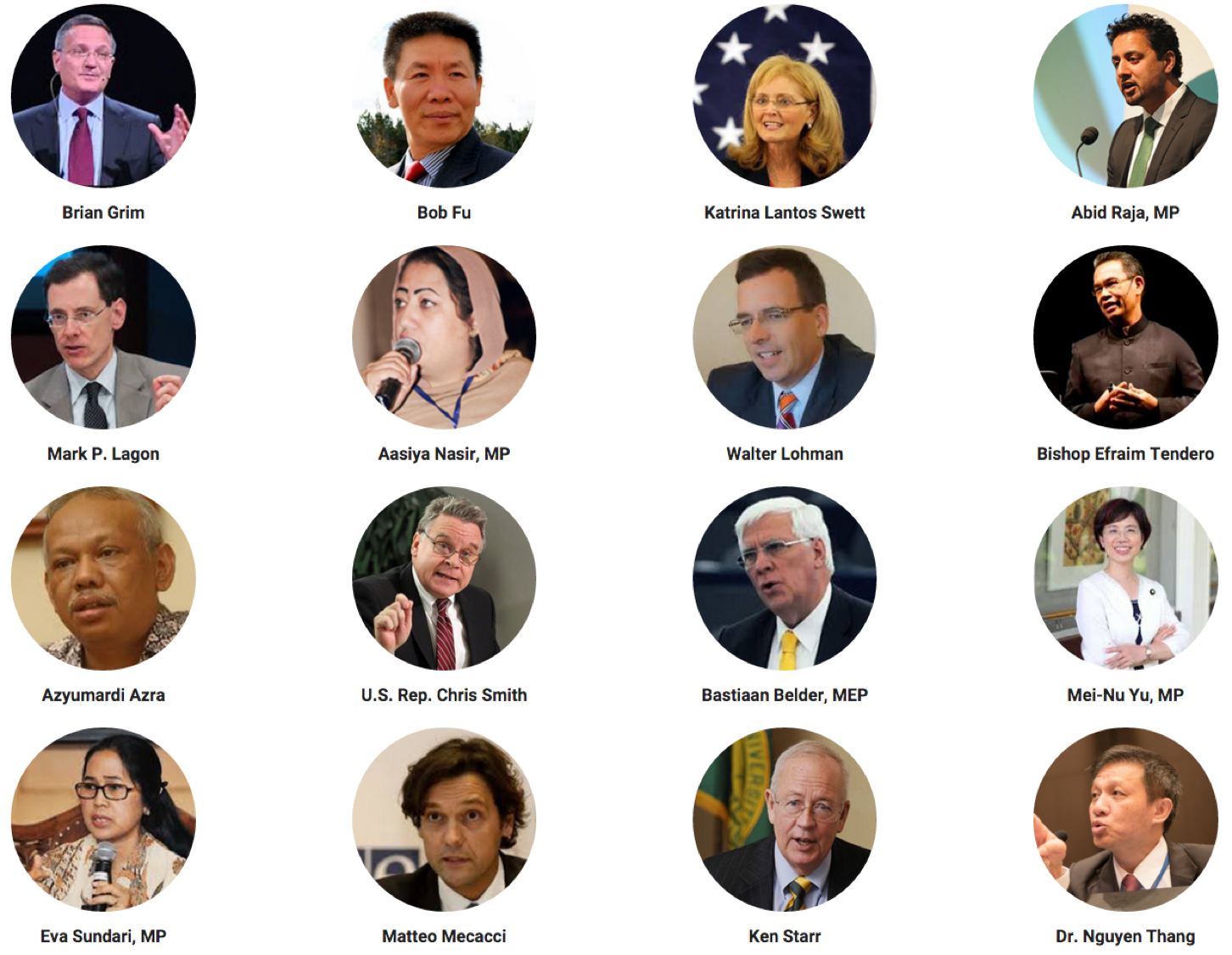
* China Aid and the Democratic Pacific Union DPU will co-host the Asia Pacific Religious Freedom Forum (APRFF). Sponsors and partners include Freedom House, Heritage Foundation, Lantos Foundation for Human Rights and Justice, Taiwan Interfaith Foundation, Stefanus Alliance International, International Campaign for Tibet, Presbyterian Church in Taiwan, and Tzu Chi Foundation, Chinese Regional Bishops’ Conference, and the International Religious Freedom Roundtable, among others.
APRFF Hosts
|
China Aid is a Christian international human rights organization with a mission to expose religious freedom and human rights abuse, encourage those abused and equip community and religious leaders in China. China Aid was founded in 2002 by Bob Fu. |
|
The Democratic Pacific Union (DPU) is an international NGO aimed to promote “democracy, peace, and prosperity” in the Asian Pacific region and the world. The DPU was founded in 2005 by former Taiwanese Vice President Annette Lu. |
APRFF Host City
|
Taoyuan is a special municipality in northwestern Taiwan and the fourth largest metropolitan area in Taiwan. Taoyuan hosts a large number of industrial parks and technology companies, and is also home to the Taipei Taoyuan International Airport, which serves the capital, Taipei and northern Taiwan. Taoyuan means “peach garden” as the area is widely known for its peach blossom trees. |
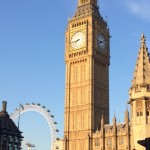 On 2 March 2016, a seminar held at the UK Parliament, and hosted by the All-Party Parliamentary Group on the Baha’i Faith, heard that there is a strong correlation between religious freedom, economic freedom, and other civil political freedoms.
On 2 March 2016, a seminar held at the UK Parliament, and hosted by the All-Party Parliamentary Group on the Baha’i Faith, heard that there is a strong correlation between religious freedom, economic freedom, and other civil political freedoms.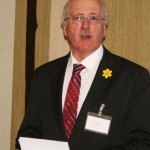 “Business is the crossroads of culture, commerce, and creativity. What brings everyone together and produces a successful service, innovation, or production is a common goal,” said Prof. Grim, who highlighted the efforts of one major automobile manufacturer which, realizing it employs people from almost 140 countries, offers an annual award for intercultural and interfaith innovation.
“Business is the crossroads of culture, commerce, and creativity. What brings everyone together and produces a successful service, innovation, or production is a common goal,” said Prof. Grim, who highlighted the efforts of one major automobile manufacturer which, realizing it employs people from almost 140 countries, offers an annual award for intercultural and interfaith innovation.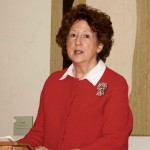 (Pictured: Baroness Anelay of St Johns, the Minister of State at the Commonwealth Office, addressing the Seminar on Freedom of Religion and Economic Prosperity, held at Westminster, 2 March 2016. With intolerance increasing around the world, she said the commitment to freedom of religion and belief is needed more than ever.)
(Pictured: Baroness Anelay of St Johns, the Minister of State at the Commonwealth Office, addressing the Seminar on Freedom of Religion and Economic Prosperity, held at Westminster, 2 March 2016. With intolerance increasing around the world, she said the commitment to freedom of religion and belief is needed more than ever.)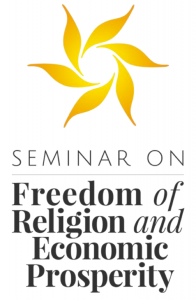 Religious freedom, or the lack of it, has emerged as one of the major challenges to human rights in the early 21st century. International developments including intra-state conflict, state-sponsored repression and terrorism have increased as drivers for religious intolerance across the world and particularly in territories affected by the conflicts that have intensified in recent years.
Religious freedom, or the lack of it, has emerged as one of the major challenges to human rights in the early 21st century. International developments including intra-state conflict, state-sponsored repression and terrorism have increased as drivers for religious intolerance across the world and particularly in territories affected by the conflicts that have intensified in recent years.

